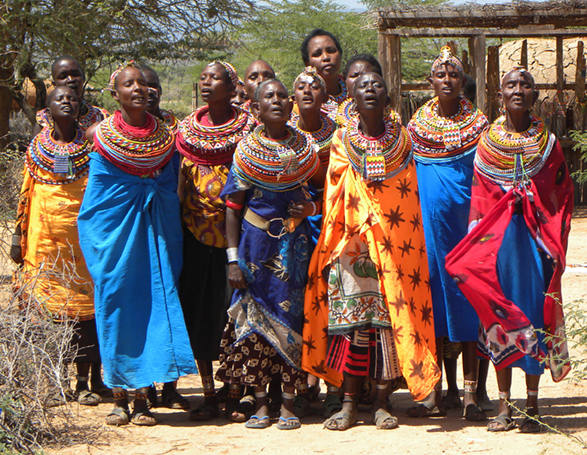By Patricia Andersson
Kathleen Colson, founder of The BOMA Fund, is also a travel guide, and arranged our trip to Kenya that included visiting not only her own nonprofit, but also many other women’s groups. Our best-of-both worlds adventure alternated safari game drives with visits to meet and talk with local women who are working their way out of poverty and creating better lives for themselves and their children.
The first group we met with was the BOMA business mentors, who traveled down from their homes in the remote regions of northern Kenya. We spent three days together, getting to know each other on game drives and a trip to Umoja Village. For most of the mentors, the game drives were the first time they had seen many of the wild animals native to their own country. On our last day with them, they gave us a presentation of their work, and also showed us some traditional dances and songs from their region. In this photo, they brought us into a dance of friendship with them.
We also visited Umoja Village while we were in the Samburu region of Kenya. This is a women-only village that is a haven for women escaping domestic violence. The women there speak out against female genital mutilation (FGM), still prevalent in their culture, encourage education for girls, and work for more rights for women. They greeted us with song and dance and gave us a tour of their village. These resilient women support themselves with the sale of the handicrafts they make, as well as the village tours they give to interested travelers.
On our way across Kenya, we stopped at the Ujima Foundation. This is a school for young adults who have been orphaned, and are supporting younger siblings. The school trains them in the hospitality business, so they can be employed as waiters, maids, receptionists and other positions in the service industry. We were able to observe one of their classes, and were so impressed by the dedication and drive of these hard-working young adults. That night, we stayed at Mali Saba, the beautiful lodge owned by the Ujima Foundation, and operated by many of the graduates of their program.
One of the highlights for many of us was a visit to Hellen Nkuraiya and her village of Maji Moto, a tiny and remote area in the Maasai region. This area is near Maasai Mara, the largest game reserve in Kenya, directly north of the Serengeti. Hellen started the school shown as a way to provide and encourage education for Maasai girls that are often married off at young ages. A sign on her gate reads “Don’t exchange girls for cows — give them an education instead. The normal bride price for a young girl is six cows. More can be read about her village and its associated projects at www.majimoto.org
Our last exposure to some of the women’s groups operating in Kenya was when we were staying at Sekenani Lodge in Maasai Mara, experiencing the amazing wildlife. Four representatives from the Maasai Girls Education Fund (MGEF) came to visit us, and gave us a presentation about their program. Caroline Kasinin (pictured), one of the girls who was sponsored by MGEF, told us the story of her struggle to obtain an education before her sponsorship. Her determination and fierce advocacy of the rights of girls to be educated moved everyone deeply, and there was not a dry eye in the audience when she finished her story. Visi twww.maasaigirlseducation.org to learn more about this organization or to sponsor a girl yourself.

